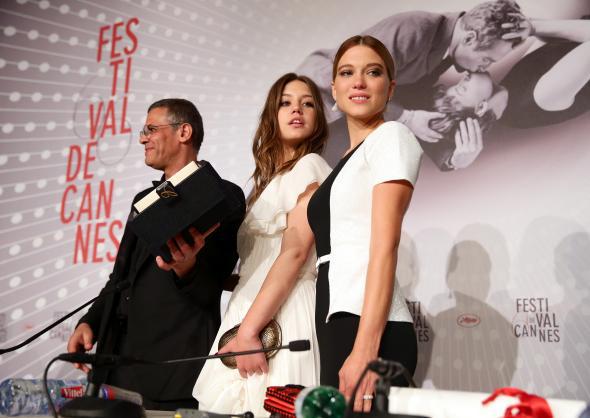There was an aura of anomaly attached to the French film Blue Is the Warmest Color (La vie d’Adèle) from the moment it won this year’s Palme d’Or, the top prize at the Cannes Film Festival. As the New York Times’ Manohla Dargis reported, the competition jury decided to “formally recognize not only the movie’s director, Abdellatif Kechiche, but also its two young actresses, Adèle Exarchopoulos and Léa Seydoux,” an “unusual, perhaps unprecedented step,” which “acknowledged the contributions of both women, who appear naked in several sex scenes, but … also took some auteur sheen away from Mr. Kechiche.”
Soon afterward, Julie Maroh, the young writer whose graphic novel the movie was based on (you can see an excerpt here), shared her mixed opinions on the film. Although she described it as “coherent, justified and fluid … a master stroke,” she also said that she felt the film suffered from a lack of lesbians on the set. She called the love scenes “a brutal and surgical display, exuberant and cold, of so-called lesbian sex, which turned into porn, and made me feel very ill at ease.”
And then the lead actresses accompanied the film to a handful of U.S. festival appearances, and things got even stranger. In an interview with the Daily Beast’s Marlow Stern, Exarchopoulos and Seydoux described the shoot as “horrible,” said that Kechiche had acted “crazy” during production, and called him “tortured” (albeit a tortured “genius”). Both said they wouldn’t work with him again.
Finally, this week, Kechiche gave an anguished interview to the French film magazine Télérama, in which he appeared to say that he wishes the film wouldn’t be released. (Unless something drastic happens, though, it will be in U.S. cinemas on Oct. 25.) According to the Hollywood Reporter, Kechiche now thinks the actresses’ comments have sullied the film and affected the audience’s ability to experience it with a pure heart and kind eyes.
But why were the actresses so hard on the director of a film that brought them so much esteem? Of course, it’s a real possibility that Kechiche really was a tyrant. Earlier this year, the French cinema union complained about violations of the labor code during the five months of filming and said that several crewmembers left the shoot because of the director’s bullying ways. He works in an improvisational way, which at the very least can be exhausting.
Still, it’s unusual for actors to complain about the people who have the power to hire them. Perhaps it’s relevant here that Léa Seydoux is from an extremely prominent French family, which includes a grandfather who is chairman of the movie and music conglomerate Pathé and a great-uncle who is CEO of the French film studio Gaumont. As Slate contributor Sam Adams observed on Twitter, “I do think you have to factor in the politics of a Tunisian director being attacked by a white French aristocrat.”
I suspect, too, that the actresses wanted to put some space between themselves and their roles in Blue Is the Warmest Color. In the Daily Beast interview, both mention their boyfriends multiple times, say the sex scenes were “embarrassing”—both to film and to watch alongside their families—and Exarchopoulos declares, “I’m not that familiar with lesbian sex.” To be sure, nobody who would take a leading role in a lesbian love story could be accused of being a full-on, old-school homophobe, but Exarchopoulos and Seydoux do appear to be going to great lengths to remind everyone that they’re straight. I wonder, was that the seed from which all these sprouts of dissent grew?
